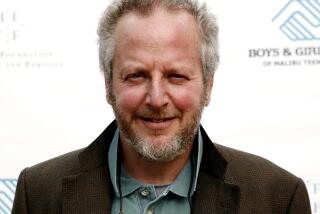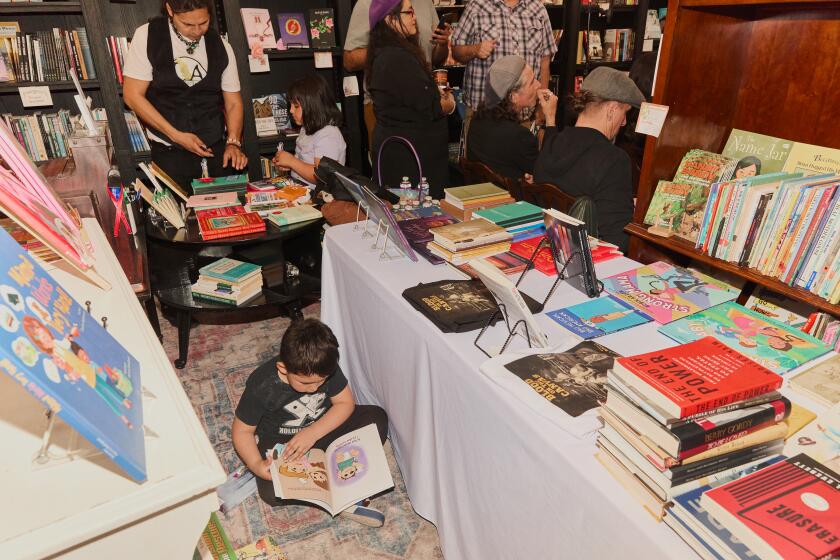Love Child
If you came of age during the late 1960s, you might have known someone like Sharon Spiegelman, the heroine of Allegra Goodman’s new novel, “Paradise Park.” Sharon supports herself by working at schlock emporiums and juice bars, but her real job is seeking God. She looks in all the standard places--nature, drugs and courses in comparative religion--and then in all the predictable religions--Christianity, Buddhism and Hasidic Judaism. There’s a guy for every phase, and just as every religion is finally it, at least for a few weeks, so every guy is finally the one. Until, of course, one really is.
Sharon gets her start as a Boston University dropout who loves folk dancing at MIT. She follows a boyfriend to Hawaii, and when he dumps her, she stays in the islands. Although Sharon’s story continues for 20-odd years, she doesn’t belong to the world of high rents and easy money. Sharon is a seeker--or, as she puts it, “my spirit has dancing feet.”
The same knack for detail that Goodman brought to “Kaaterskill Falls” is evident in “Paradise Park,” although the domestic life on display is of a hippie cast. “Here’s what I took to Hawaii: my guitar, and my backpack with my name on it in black laundry marker. In the backpack: six panties, and a bra. Five T-shirts of different colors, a pair of shorts (I wore my jeans), two Indian gauze skirts wadded up into little balls, and a macrame bikini. A notebook and a ballpoint pen to write down my feelings.”
In writing Sharon’s voice, Goodman had to enable the reader to see beyond Sharon’s constant enthusiasm for the next new thing and her unwillingness to acknowledge uncomfortable facts. So, for example, Goodman has Sharon describe her relationship with a jealous, sometimes violent ex-Marine: “To be perfectly honest he didn’t lift a hand against me all that time. Just about the only thing he did was break one of the co-op chairs, which did frighten me. But it was just that once. And I’d never even liked that chair.”
And Goodman had to make Sharon appealing as well as exasperating. She gives her a sense of humor--as when she describes a department store where she works, selling “everything you could imagine, only they were all designed for life on a Japanese planet” or when she says that a Hasid who meets her at the airport is “carrying a placard like from a Rabbinic limo service.” At other times she falls into mystical poetry:
“In the morning light the ocean spread out around us and you felt how the land was just a speck out there in the water . . . . You felt out there under that blue sky and in that sea you might actually be resting in the palm of God.”
Throughout, Sharon’s sensuality and her love of music and language (quotations in English and Hebrew from the Song of Solomon, particularly the beautiful section that begins, “I am the rose of Sharon,” run through the book) define a “real” Sharon who has dignity and authenticity despite herself.
Eventually, Sharon is drawn to the Judaism her family only nominally practiced. Being Sharon, she can’t just join a synagogue. Instead she flies to Jerusalem to enroll in a women’s course at an Israeli Torah academy where, not coincidentally, an old boyfriend is now studying. But Sharon can’t take the emphasis on discipline and Jewish law (“I came here for the truth about the Creator, not home ec!”). She is more attracted to the mysticism espoused by a Bialystoker (read Lubavitch) Hasidic missionary and his brisket-cooking wife. Sitting at their table, Sharon realizes that the strongest nostalgia is “when you’re missing and reminiscing about what you never had.” In Sharon’s case, what she never had was not only Judaism (her beloved grandfather was a union organizer, not a Hasid) but the warm and supportive family she finds with the Bialystokers.
When Sharon meets Mikhail, a Russian immigrant musician who is also studying Hasidism, a proposal soon follows, but their planned marriage is temporarily derailed when Sharon discovers (and blurts out) that Mikhail’s mother was a Christian convert to Judaism. For the Bialystokers (and for the ultra-Orthodox generally), the question of who performs conversions and thus who is a Jew is of paramount importance; Sharon dismisses it as “technicalities.” In time, Sharon and Mikhail create a life together, complete with worship at a Jewish group that meets at its members’ homes, reconciliation with Sharon’s awful parents and the birth of a tiny son. Sharon tells an old boyfriend, who asks if she has found what she was looking for, “I realized . . . I didn’t need to go on looking anymore.”
Early on in her life in Hawaii, Sharon visited Paradise Park, a series of walk-through aviaries. She recognized that the birds there were probably happy but wonders, “[I]f the structure is imposed from the outside, how can a place be a true utopia? A real paradise, that would have to come from inside the birds themselves; that would come from their own hearts.”
In Sharon’s own journey through the Paradise Park of religions sacred and secular, she wrestles constantly with this question. Perhaps Goodman sees Sharon’s seeking as mere sound and fury and that she herself believes in trading your freedom for happiness. But she also finds something brave and beautiful in Sharon’s quest. She makes Sharon the heroine of this book, not the young Hasidic woman who cheerfully follows the prescriptions of the insular culture in which she was raised. The structure and commitment Sharon finally embraces are not a cage, not even a comfortable one. Rather, her new life comes from her own heart; as she says when she decides to marry Mikhail in the face of the Bialystokers’ disapproval, “my regular old wild heart was still beating inside me.” Sharon’s wild heart leads her into all sorts of dead ends, but in the end, it brings her home.
More to Read
Sign up for our Book Club newsletter
Get the latest news, events and more from the Los Angeles Times Book Club, and help us get L.A. reading and talking.
You may occasionally receive promotional content from the Los Angeles Times.






